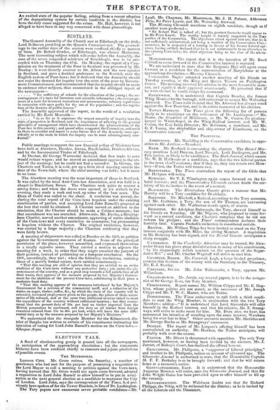SCOTLAND.
•
The General Assembly of the Church met at Edinburgh on the 20th; Lord Belhaven presiding as the Queen's Commissioner. The proceed- ings in the earlier days of the session were confined chiefly to matters of form. Dr. Robert Gordon, of Edinburgh, was chosen Moderator. The most interesting subject which will come before the Assembly, the case of the seven suspended ministers of Strathbogie, was to be pro- ceeded with on Thursday the 27th. On Monday, the report of a Com- mission on the treatment of the Poor in Scotland was presented by Mr. Dunlop : it went directly counter to Dr. Alison and the new opinion in Scotland, and gave a decided preference to the Scottish over the English system of Poor-laws ; but it declared that the Assembly should not resist the demand for inquiry into the state of the poor by Govern- ment Commissioners, and recommended that the inquiry should be made to embrace other subjects, thus enumerated in the abridged report of the newspapers— "tile sufficiency of schools for the education of the young ; the en- couragement of a taste for literature and scientific information ; the encourage- ment of a taste for innocent recreations and amusements ; salutary regulations in connexion with open parks for the use of the population ; and the regula- tion of the licences of public-houses."
The Assembly approved of the report, in the words of a resolution carried by Mr. Earle Monteith-
. in so far as it expresses the urgent necessity of inquiry into the state of pauperism in Scotland, and the importance of adhering to the general principles of management which have characterized the administration of the Poor-law in this country ; and guoad ultra, reappoint the Committee, and remit to them to consider and report to some future diet of the Assembly more spe- cifically as to the mode in which the inquiry can be most advantageously con- ducted.'
Public meetings to support the new financial policy of Ministers have been held at Aberdeen, Dundee, Annan, Dunfermline, Dunbar, Girvan, and by the Incorporated Trades of Edinburgh. At Dunbar, Sir George NVarrender declared that free trade in corn would reduce wages ; and he moved an amendment opposed to the ob- ject of the meeting ; but he could not find a seconder. In Girvan, the Chartists and Tories, it is said, got up a little rival meeting outside the door of the Town-hall, where the chief meeting was held ; but it came to no issue.
The Aberdeen meeting was the most important of those in Scotland. It was called by the local Anti-Corn-law Association, and was held in a chapel in Blackfriars Street. The Chartists took pains to muster a strong force ; and when the doors were opened, at six o'clock in the evening, they made a rush and took up some of the best seats. The Dean of Guild was called to the chair. A resolution was moved, de- claring the total repeal of the Corn-laws hopeless under the existing combination of parties, and accepting Lord John Russell's proposal as the best that could be obtained. A Chartist moved an addition to the resolution, that the Charter should be made a Cabinet measure ; but that amendment was not seconded. Afterwards, Mr. Davies, a Birming- ham Chartist, moved another amendment, approving of entire abolition a the Corn-laws and every restriction on commerce, but pronouncing it hopeless without the Charter. The original resolution, however, was carried by a large majority ; the Chartists confessing that they were fairly beaten.
A meeting of shipowners was called at Dundee on the 12th, to petition against the Government measures of finance. Some of the principal merchants of the place, however, assembled, and expressed themselves in a totally opposite sense. They carried a motion to adjourn the meeting for a week, in order that they might consider the purport of their petition, instead of petitioning on a foregone conclusion. On the 19th, accordingly, they met ; when the following resolutions, omitting those of a merely formal nature, were carried unanimously-
" That this meeting are still of opinion that they are entitled to an entire abolition of the Corn-laws without any protective duty ; yet, under the cir- cumstances of the country, and as a great step towards a full satisfaction of all their wants they approve of the measure proposed by her Majesty's Govern- ment for the abolition of the present Corn-laws, substituting in their place a moderate fixed duty. "That this meeting approve of the measures introduced by her Majesty's Government for a revision of the commercial tariff, and a reduction of the duties on sugar, timber, coffee, &c., by which the trade of the country will be extended, increased employment given to the people, the prices of these neces- saries of life reduced, and at the same time additional revenue raised to meet the expenditure of the country without additional taxation ; but they recom- mend that the present duty of 10s, per load on timber imported from the British possessions be continued, and the duty on all timber from foreign countries reduced from 55s to 40s. per load, which will leave the same diffe- rential duty as by the measure proposed by her Majesty's Ministers."
We understand that the renegade Member for the Kilmarnock dis- trict of Burghs has written to certain of his constituents intimating his intention of voting for Lord John Russell's motion on the Corn-laws.— Glasgow Argus.


























 Previous page
Previous page